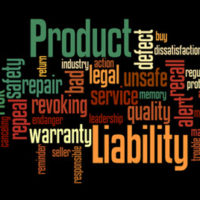When Is a Parts Manufacturer Responsible for a Fatal Injury in Tennessee?

Product liability lawsuits are often complex undertakings because they can involve multiple manufacturers. In a motor vehicle or industrial machine there can be hundreds–and potentially thousands–of individual parts. And even when you identify the individual part that is responsible for a personal injury, that does not automatically make the manufacturer liable as a matter of law.
Judge Rules Safety Mat Producer Not Liable for Bridgestone Worker’s Death
Consider this recent decision by a federal judge in Nashville granting summary judgment to the defendant in a product liability lawsuit arising from the 2013 death of a Bridgestone assembly-line worker. The victim operated a tire assembly machine for Bridgestone. This machine used a safety mat manufactured by the defendant in this case. The safety mat is supposed to detect the presence of a worker and stop the machinery above from crushing him.
Tragically, that did not happen here. According to court records the victim was “caught in the machine” and effectively crushed to death. The victim’s family filed a lawsuit against the defendant, alleging negligence, strict products liability under Tennessee law, and breach of express and implied warranties. The judge presiding over the case dismissed the warranty claims because they were filed outside of Tennessee’s four-year statute of limitations.
The judge then disposed of the remaining allegations on summary judgment. Under Tennessee law, a manufacturer is strictly liable for an injury or death caused by a product that was “defective and/or unreasonably dangerous” at the time it left the manufacturer’s control. In this case, despite the plaintiffs presenting evidence of “soldering defects” in the construction of the safety mats, the defendant maintained that its product was “completely safe for normal or anticipatable handling.” In fact, the defendant said if anyone was liable it was Bridgestone that for failing to properly install the safety mats. The judge agreed, holding that “the employer’s intervening negligence” in failing to follow the defendant’s safety instructions was the “sole” cause of the victim’s death.
In addition, the judge held the defendant was not liable for any “failure to warn” because its safety mats contained “at least two prominent boxed warnings” that the product needed to be installed in a particular manner. Under Tennessee law, a manufacturer need only provide an “adequate warning” that informs a “reasonably prudent user of the product”“ as to the “nature and the extent of the danger involved in using the product.” Here, the judge said “reasonable minds” could not differ on whether the defendant’s warnings were adequate.
Get Help From a Knoxville Product Liability Attorney
Product liability claims may encompass issues of defective design or manufacturing process, or a failure to warn users of potential safety hazards. Resolving these issues requires a highly fact-specific inquiry, as judges and juries must examine not only the manufacturer’s actions but the typical consumer’s expectations and knowledge when using a given product. This is why if you or a family member have been injured due to a dangerous or defective product, it is critical to work with an experienced Tennessee personal injury lawyer who knows to how to build these kinds of cases. Contact the offices of Fox, Farley, Willis & Burnette, Attorneys at Law, in Knoxville, Clinton, Gatlinburg, Pigeon Forge, or Sevierville today to schedule a consultation with a member of our team to discuss your case.
Source:
scholar.google.com/scholar_case?case=13708116146390069094
